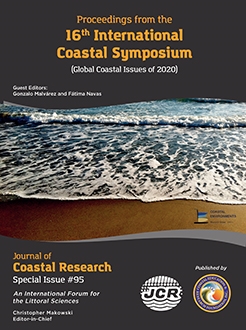Soares, M.L.G.; Castro, E.M.N.V., and Pellegrini, J.A.C., 2020. Socioenvironmental aspects related to mangrove forests under the influence of oil explotation activities in Northeastern Brazil: An interdisciplinary approach. In: Malvárez, G. and Navas, F. (eds.), Global Coastal Issues of 2020. Journal of Coastal Research, Special Issue No. 95, pp. 88-91. Coconut Creek (Florida), ISSN 0749-0208.
This study analyses, from an interdisciplinary perspective, the connections between environmental vulnerability of the mangrove forests of Garapuá (Bahia, Brazil) and the social vulnerability of the shellfish collectors and fishermen, from the tensions inflicted with the insertion of the oil industry. It presents the interpretation of complex phenomena and integrated management of the environment, incorporating both the social and biological aspects. The analysis of local socioenvironmental processes was focused on the integration of (a) the characterization of mangrove forests structural types, by using quantitative methods, that allowed a classification of mangrove forests vulnerability to oil spill considering three components (susceptibility, sensitivity and resilience) and (b) the characterization of social tensions, through field observations and semi-structured interviews, from the point of view of the qualitative approach, that allows an analysis of the social vulnerability to changes in the community livelihoods, which are closely related to the health of the mangrove system. As a result of these analysis we found 12 Structural Types for the studied forests, comprising different levels of environmental vulnerability to oil spills. Regarding social context, some aspects related to health, education, income, transportation, religion and social organization that emerged from the interviews point to an evident fragility of the social structure. Besides this, the intense pressure for land occupation, coupled with the arrival of the oil industry, increases the vulnerability of these biological formations and, as a consequence, increases the vulnerability of the local community. The study also demonstrates that interdisciplinary analyses strengthen the debate in different segments of society (companies, environmental agencies, non-governmental organisations, universities, social groups, etc.) and, consequently, tends to foment the transformation of the socioenvironmental reality experienced by social groups without decision power.





